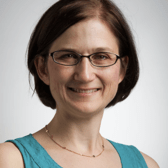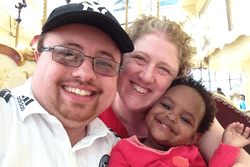For Jewish Adoptive Mothers Like Me, Mother’s Day is Anything But Simple
Growing up, I never thought too deeply about Mother’s Day. As a child, I made homemade Mother’s Day cards and “world’s best mother” ribbons, but my family was never particularly into “Hallmark holidays,” and we rarely did elaborate celebrations. I was—and still am—very close to my mother, and Mother’s Day was just an uncomplicated occasion on which to say an extra special “I love you.”
For a time in adulthood, however, Mother’s Day became agonizing. As my husband and I went through several years of infertility treatment, I still needed and wanted to say that special “I love you” to my own mother, but I was also acutely aware of having no one to say it to me. Seeing motherhood celebrated all around me while I was trying so hard—and unsuccessfully—to become a mother myself was torture.
Then, finally, fifteen years ago, I did become a mother, when we adopted our daughter from China. Every day since then, I have felt deeply grateful for the privilege of being a parent to a child who has enriched my life immeasurably. But while Mother’s Day is no longer torturous, it will never go back to being uncomplicated for me. Instead, it’s an occasion filled with complexity, as all members of the adoption triad (adoptive parents, birth parents, and adoptees) well know.
For adoptive mothers, Mother’s Day is a combination of joy, sadness, love, and loss. We are conscious of the fact that we owe our happiness, as well as a central pillar of our identity, to a profound loss on the part of both our own beloved children and the mothers who birthed them. We know that we share our children with other parents and extended families—whether in our actual lives (in the case of open adoption) or in our hearts and minds (in the case of closed adoptions). This deep sense of shared parenthood, even with someone we might never have met, may be unfathomable to people who have never experienced it, but it is powerful for those of us in the adoption community.
I would never presume to speak for my daughter and other adoptees, but I can only imagine that Mother’s Day is even more complicated for them. Whether subtly or overtly, adopted children are often given the message that they should be “grateful” to the parents who are raising them, leaving them with little opportunity to express the grief they may feel for the loss of their first parents, their communities, their cultures, even their languages. On Mother’s Day, they may be reluctant even to admit that they are thinking of their birth mothers, for fear of jeopardizing their adoptive mothers’ experience of the day. If they are in open adoption arrangements, they may feel they have to choose with which mother to spend the day or worry about how to express complicated emotions without hurting either mother’s feelings.
Mother’s Day is perhaps most difficult for the women who have been separated from their children through adoption. Some pregnant women make a deliberate adoption plan for their babies, deciding that they are not in a position to parent. Others are forced by economic, political, or social circumstances to surrender their children. Still others experience the heartbreak of having their children removed from their care, sometimes for racist or classist reasons. All these women are judged for “giving up” their children or somehow “failing” as mothers. And Mother’s Day can be another excruciating reminder that the children to whom they gave birth are no longer theirs to parent. Many suffer in silence as those around them celebrate a relationship they were counseled to forget in order to “move on with their lives.”
A few decades ago, as adoption began to emerge from the secrecy and stigma in which it had been cloaked in the mid-twentieth century, some birth mothers began to observe the day before Mother’s Day as Birth Mother’s Day, an occasion to come together with others who understood their experiences. Over time, the practice has spread to adoptive families. Adoptive parents increasingly encourage their children to honor their birth mothers on one day and their adoptive mothers the next. Even if adoptees in closed adoptions can’t see or speak to their first mothers, observing Birth Mother’s Day might involve planting a tree in her honor, writing her a letter or card, or simply dedicating time to talking or thinking about her.
What does any of this have to do specifically with Jews?
Until recently—and still today for Conservative and Orthodox Jews—Jewish identity was passed from (biological) mother to (biological) child. Even though the Reform and Reconstructionist movements now recognize patrilineal descent as well, the historical importance of matrilineal descent has given particular weight to the mother-child relationship in Jewish culture. Intense communal concerns about Jewish continuity have only heightened this significance. In the wake of the Holocaust and in the face of fears about assimilation, Jewish women’s roles in perpetuating the Jewish people (through reproduction) and Jewish identity (through transmission of Jewish culture) have taken on even more significance.
From a feminist perspective, these communal expectations of Jewish motherhood are problematic, to say the least. From an adoption perspective, they can make Mother’s Day particularly fraught for Jewish members of the adoption triad. For Jewish women who have placed a child for adoption or had a child removed from their care, they can lend added sorrow to an already difficult day. Even if these communal expectations are unrealistic, unfair, and stifling, they can make women feel that they are failing to fulfill what is often seen as the quintessential female Jewish role, and as a result are somehow failing their community.
For Jewish adoptive mothers, communal expectations about motherhood make Mother’s Day an occasion for reflecting on what is often for us a particularly complicated question: What do we want to pass along to our children? For better or worse, it is well established that women generally take on the role of “culture keeper” in both the Jewish and adoption communities. Since the vast majority of children adopted by Jewish parents today are adopted across boundaries of identity (racial, ethnic, religious, and/or national) and parents are encouraged to bring their children’s birth cultures into their lives, Jewish adoptive mothers are responsible for raising their children with both a strong Jewish identity and a strong sense of connection to the cultures and communities of their birth. A weighty task indeed.
For adoptees raised in Jewish families, the emphasis on biological motherhood in Jewish law and tradition can be highly problematic. Especially for the adoptees who weren’t born to Jewish birth mothers, it can lead to the painful experience of having their Jewish identity questioned or disputed. For all Jewish adoptees, Mother’s Day offers both opportunities and challenges—the opportunity to honor their multiple mothers (adoptive and biological, as well as grandmothers and foster mothers), and the challenge of reflecting on the meaning of all their parents, cultures, and communities.
What will I be doing on Mother’s Day weekend this year? I hope giving my daughter the space to think about and honor her birth mother in whatever way and to whatever extent feels meaningful to her. Feeling immensely thankful for my daughter’s presence in my life. Sending thoughts, love, gratitude, and compassion to my daughter’s other mother, whom I will most likely never meet. And giving my own mother an extra special hug.








Thank you for this thoughtful piece
Wonderful article. Opened my eyes to issues I’d never considered. Thank you. And happy Mother’s Day!!
So beautiful, thank you for sharing your insights, your wisdom, and your feelings so sensitive and true.
Wow. I suppose when my daughter was a wee bit I did think of her birth mom. And I've always been thankful that she helped me become a momma. I used to send pictures but she quit accepting.
Sarah was converted to Judaism in Barton springs. A beautiful spring without a beginning nor end.
I've never had anyone dispute her heritage,even when she went to Israel.
Now, my first grandchild is due in december(yes, she's barely pregnant), but I wholeheartedly believe she is giving birth to the next generations of jews. Your sweet daughter one day will too.
Happy mothers day to you!